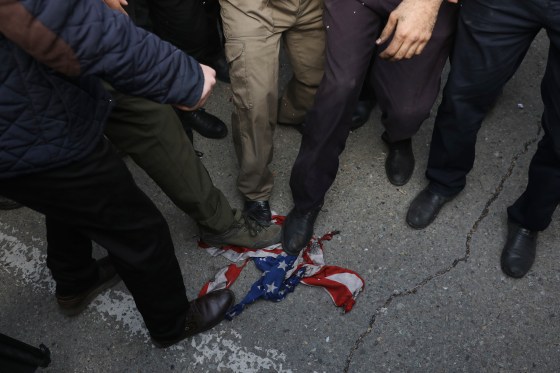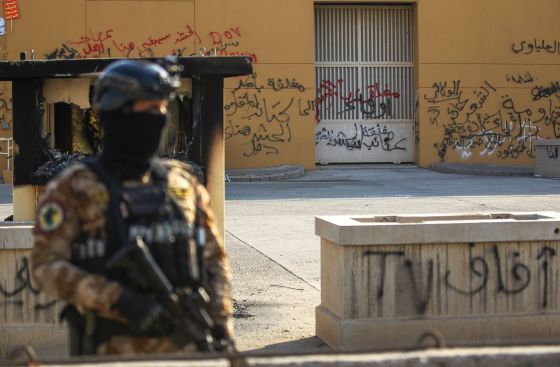(BAGHDAD) — Iran has vowed “harsh retaliation” for a U.S. airstrike near Baghdad’s airport that killed Tehran’s top general and the architect of its interventions across the Middle East, as tensions soared in the wake of the targeted killing.
The killing of Gen. Qasem Soleimani, the head of Iran’s elite Quds Force, marks a major escalation in the standoff between Washington and Iran, which has careened from one crisis to another since President Donald Trump withdrew from the 2015 nuclear deal and imposed crippling sanctions.
The United States urged its U.S. citizens to leave Iraq “immediately.” The State Department said the embassy in Baghdad, which was attacked by Iran-backed militiamen and other protesters earlier this week, is closed and all consular services have been suspended.
Around 5,200 American troops are based in Iraq, where they mainly train Iraqi forces and help to combat Islamic State militants.
Iran’s Supreme Leader Ayatollah Ali Khamenei warned that a “harsh retaliation is waiting” for the U.S. after the airstrike, calling Soleimani the “international face of resistance.” Khamenei declared three days of public mourning for the general’s death, and appointed Maj. Gen. Esmail Ghaani, Soleimani’s deputy, to replace him as head of the elite Quds force.
Iran also summoned the Swiss charges d’affaires, who represents U.S. interests in Tehran, to protest the killing. Iran’s Foreign Minister Mohammad Javad Zarif called the strike “an act of state terrorism and violation of Iraq’s sovereignty.”
The killing, and any forceful retaliation by Iran, could ignite a conflict that engulfs the whole region, endangering U.S. troops in Iraq, Syria and beyond. Over the last two decades, Soleimani had assembled a network of heavily armed allies stretching all the way to southern Lebanon, on Israel’s doorstep.
However, the brazen killing may itself act as a deterrent, with fears of an all-out war leading Iran and its allies to delay or restrain any potential response.

The Defense Department said it killed Soleimani because he “was actively developing plans to attack American diplomats and service members in Iraq and throughout the region.” It also accused Soleimani of approving the orchestrated violent protests at the U.S. Embassy in Baghdad earlier this week.
The 62-year-old Soleimani was the target of Friday’s attack on an access road near the airport, which was conducted by an armed American drone, according to a U.S. official. The airport strike also killed Abu Mahdi al-Muhandis, deputy commander of Iran-backed militias in Iraq known as the Popular Mobilization Forces. A PMF official said the strike killed a total of eight people, including Soleimani’s son-in-law, whom he did not identify.
A senior Iraqi security official said the airstrike took place near the cargo area after Soleimani had disembarked from a plane arriving from either Syria or Lebanon. PMF officials said the bodies of Suleimani and al-Muhandis were torn to pieces. A senior politician said Soleimani’s body was identified by the ring he wore.
The officials spoke on condition of anonymity because they were not authorized to talk to reporters. Trump was vacationing on his estate in Palm Beach, Florida, but sent out a tweet of an American flag.
The dramatic attack comes at the start of a year in which Trump faces both a Senate trial following his impeachment by the Congress and a re-election campaign. It marks a potential turning point in the Middle East and represents a drastic change for American policy toward Iran after months of tensions.
Tehran shot down a U.S. military surveillance drone and seized oil tankers last year. The U.S. also blames Iran for a series of other attacks targeting tankers, as well as a September assault on Saudi Arabia’s oil industry that temporarily halved its production.
The tensions are rooted in in Trump’s decision in May 2018 to withdraw the U.S. from Iran’s nuclear deal with world powers, struck under his predecessor, Barack Obama.
It’s unclear what legal authority the U.S. relied on to carry out the attack. American presidents claim broad authority to act without the approval of the Congress when U.S. personnel or interests are facing an imminent threat. The Pentagon did not provide evidence to back up its assertion that Soleimani was planning new attacks against Americans.
House Speaker Nancy Pelosi said the “highest priority” was to protect American lives and interests, but that “we cannot put the lives of American service members, diplomats and others further at risk by engaging in provocative and disproportionate actions.” She said Congress was not consulted on the strike and demanded it be “immediately” briefed on the next steps.
Democratic presidential candidate Joe Biden said Trump had “tossed a stick of dynamite into a tinderbox,” saying it could leave the U.S. “on the brink of a major conflict across the Middle East.” Other Democratic White House hopefuls also criticized Trump’s order.
But Trump allies were quick to praise the action. “To the Iranian government: if you want more, you will get more,” tweeted South Carolina Sen. Lindsey Graham.

Soleimani’s killing follows the New Year’s Eve protests orchestrated by Iran-backed militias at the U.S. embassy in Baghdad, which were not related to the anti-government demonstrations. The two-day embassy attack, which ended Wednesday, prompted Trump to order about 750 U.S. troops deployed to the Middle East. No one was killed or wounded in the protests, which breached the compound but appeared to be mainly a show of force.
The breach followed U.S. airstrikes Sunday that killed 25 fighters of Kataeb Hezbollah, an Iran-backed militia operating in Iraq and Syria. The U.S. military said the strikes were in retaliation for last week’s killing of an American contractor in a rocket attack on an Iraqi military base that the U.S. blamed on the militia.
U.S. officials have suggested they are prepared to engage in further retaliatory attacks in Iraq.
“The game has changed,” Defense Secretary Mark Esper said Thursday.
___
Karam reported from Beirut. Associated Press writers Robert Burns and Zeke Miller in Washington; Jon Gambrell in Dubai, United Arab Emirates; Nasser Karimi and Amir Vahdat in Tehran, Iran; Bassem Mroue and Sarah El Deeb in Beirut; and Joseph Krauss and Josef Federman in Jerusalem contributed to this report.
